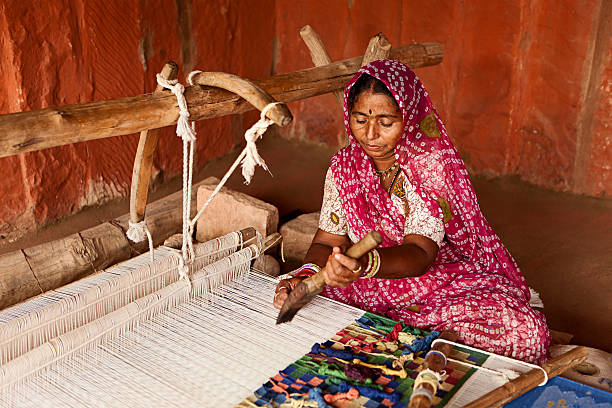#HandloomEveryday: ‘Handmade textiles are the greatest form of luxury’

In a world dominated by mass-produced goods and fast fashion trends, there is an undeniable charm and intrinsic value associated with handmade textiles. The art of handloom weaving, passed down through generations, offers a unique and exquisite form of luxury that cannot be replicated by machines. From the intricate patterns to the attention to detail, handmade textiles carry a timeless appeal that transcends trends and celebrates the richness of human craftsmanship. In this blog post, we will delve into the reasons why handmade textiles are indeed the greatest form of luxury.
Heritage and Cultural Identity: Handloom textiles are deeply rooted in the cultural heritage of communities around the world. Each region boasts its distinct weaving techniques, patterns, and motifs, reflecting the identity and history of its people. Whether it''s the vibrant and intricate ikat weaves of India or the delicate handwoven lace of Belgium, handmade textiles carry the legacy of traditional craftsmanship, preserving and celebrating cultural diversity.

Impeccable Craftsmanship: The creation of handloom textiles requires the expertise, skill, and patience of master artisans. Every thread is meticulously woven, ensuring precision and attention to detail. From the selection of high-quality yarns to the mastery of complex weaving techniques, artisans pour their heart and soul into each piece, resulting in impeccable craftsmanship that is a testament to their dedication and skill.

Unique and One-of-a-Kind: Unlike mass-produced textiles, handmade textiles are unique and one-of-a-kind. The inherent variability in the handloom weaving process means that no two pieces are exactly alike. The subtle irregularities and imperfections add character and authenticity to the fabric, making each piece a work of art. Owning a handmade textile is like owning a piece of history and a story that cannot be replicated.
Ethical and Sustainable: The rise of fast fashion has led to environmental degradation and exploited labor. Handmade textiles, on the other hand, offer an ethical and sustainable alternative. Artisans often employ eco-friendly practices, using natural fibers and dyes, and preserving traditional techniques that have a lower carbon footprint. By supporting handloom textiles, we contribute to the livelihoods of artisans and help sustain their communities, ensuring a more equitable and sustainable fashion industry.
Emotional Connection and Slow Fashion: Handmade textiles have the power to evoke a sense of connection and emotional resonance. Each piece carries the energy and love of the artisan who created it, and this personal touch can be felt when we wear or use these textiles. Handloom textiles promote a slower approach to fashion, encouraging us to value quality over quantity, and to appreciate the stories woven into each fabric.

In Conclusion, Handmade textiles are not merely pieces of fabric; they embody the essence of luxury. They represent a celebration of culture, history, and the human spirit. The unique craftsmanship, ethical practices, and emotional connection associated with handloom textiles make them a true symbol of luxury in a world dominated by mass production. By choosing handmade textiles, we honor the rich traditions of artisans and contribute to a more sustainable and meaningful way of life. So let us embrace and cherish the beauty of handmade textiles, for they are indeed the greatest form of luxury.
#HandmadeTextiles #LuxuryCraftsmanship #SustainableFashion #ArtisanalFabrics #HandloomTradition #CulturalHeritage #EthicalLuxury #UniqueTextiles #SlowFashion #HandcraftedElegance

